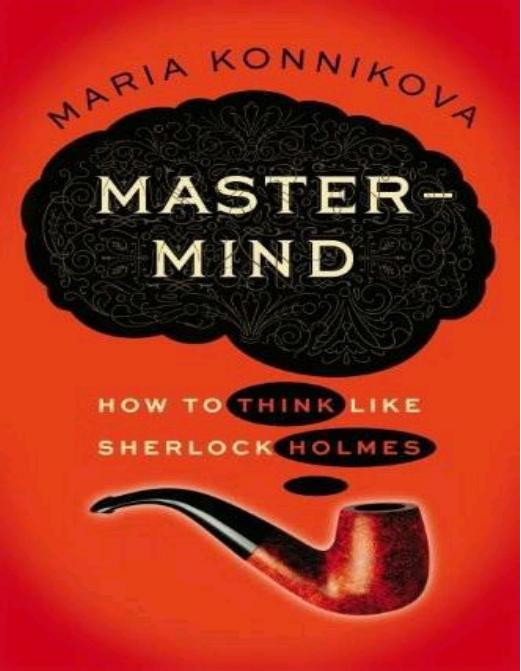Mastermind: How to Think Like Sherlock Holmes by Maria Konnikova

Author:Maria Konnikova
Language: eng
Format: mobi, epub, pdf
ISBN: 9780670026579
Publisher: Viking Adult
Published: 2013-01-02T13:00:00+00:00
Distancing Through Actual Distance
And what if, like Watson, you simply can’t fathom doing something that would enable you to think of something else, even if you have all of these suggestions to choose from? Luckily, distance isn’t limited to a change in activity (though that does happen to be one of the easier routes). Another way to cue psychological distance is to acquire literal distance. To physically move to another point. For Watson, that would be the equivalent of getting up and walking out of Baker Street instead of sitting there looking at his flatmate. Holmes may be able to change location mentally, but an actual physical change may help the lesser willed—and could even aid the great detective himself when imaginative inspiration is not otherwise forthcoming.
In The Valley of Fear, Holmes proposes to return in the evening to the scene of the crime under investigation, leaving the hotel where he has been doing most of his thinking.
“An evening alone!” Watson exclaims. Surely, that would be more morbid than anything else. Nonsense, Holmes counters. It could actually be quite illustrative. “I propose to go up there presently. I have arranged it with the estimable Ames, who is by no means whole-hearted about Barker. I shall sit in that room and see if its atmosphere brings me inspiration. I’m a believer in the genius loci. You smile, Friend Watson. Well, we shall see.” And with that, Holmes is off to the study.
And does he find inspiration? He does. The next morning he is ready with his solution to the mystery. How is that possible? Could the genius loci have really brought the inspiration that Holmes had hoped?
Indeed it could have. Location affects thought in the most direct way possible—in fact, it even affects us physically. It all goes back to one of the most famous experiments in psychology: Pavlov’s dogs. Ivan Pavlov wanted to show that a physical cue (in this case it was a sound, but it can just as easily be something visual or a smell or a general location) could eventually elicit the same response as an actual reward. So, he would ring a bell and then present his dogs with food. At the sight of the food, the dogs would—naturally—salivate. But soon enough, they began to salivate at the bell itself, before any sight or smell of food was present. The bell triggered the anticipation of food and with it, a physical reaction.
We now know that this type of learned association goes far beyond dogs and bells and meat. Humans tend to build such patterns as a matter of course, eventually leading innocuous things like bells to trigger predictable reactions in our brains. When you enter a doctor’s office, for example, the smell alone may be enough to trigger butterflies—not because you know there will be something painful (you might be coming in to drop off some forms, for all that) but because you have learned to associate that environment with the anxiety of a medical visit.
The power of learned associations is ubiquitous.
Download
Mastermind: How to Think Like Sherlock Holmes by Maria Konnikova.epub
Mastermind: How to Think Like Sherlock Holmes by Maria Konnikova.pdf
This site does not store any files on its server. We only index and link to content provided by other sites. Please contact the content providers to delete copyright contents if any and email us, we'll remove relevant links or contents immediately.
| Anatomy | Animals |
| Bacteriology | Biochemistry |
| Bioelectricity | Bioinformatics |
| Biology | Biophysics |
| Biotechnology | Botany |
| Ecology | Genetics |
| Paleontology | Plants |
| Taxonomic Classification | Zoology |
Sapiens: A Brief History of Humankind by Yuval Noah Harari(13240)
The Tidewater Tales by John Barth(12088)
Do No Harm Stories of Life, Death and Brain Surgery by Henry Marsh(6391)
Mastermind: How to Think Like Sherlock Holmes by Maria Konnikova(6356)
The Thirst by Nesbo Jo(5880)
Why We Sleep: Unlocking the Power of Sleep and Dreams by Matthew Walker(5761)
Sapiens by Yuval Noah Harari(4696)
Life 3.0: Being Human in the Age of Artificial Intelligence by Tegmark Max(4605)
The Longevity Diet by Valter Longo(4521)
The Rules Do Not Apply by Ariel Levy(4008)
The Body: A Guide for Occupants by Bill Bryson(3960)
The Immortal Life of Henrietta Lacks by Rebecca Skloot(3895)
Why We Sleep by Matthew Walker(3855)
Animal Frequency by Melissa Alvarez(3822)
Yoga Anatomy by Kaminoff Leslie(3765)
Barron's AP Biology by Goldberg M.S. Deborah T(3680)
The Hacking of the American Mind by Robert H. Lustig(3664)
All Creatures Great and Small by James Herriot(3601)
Yoga Anatomy by Leslie Kaminoff & Amy Matthews(3460)
